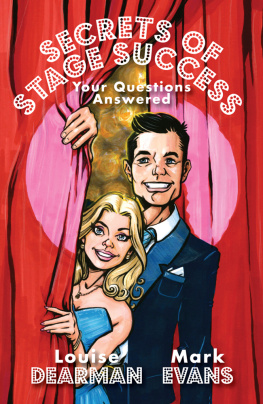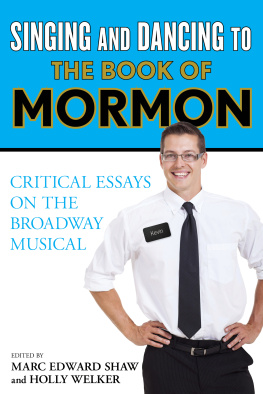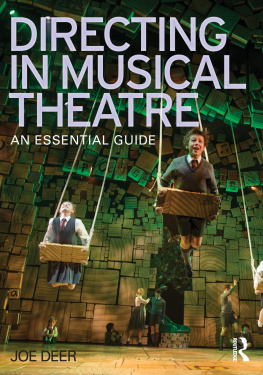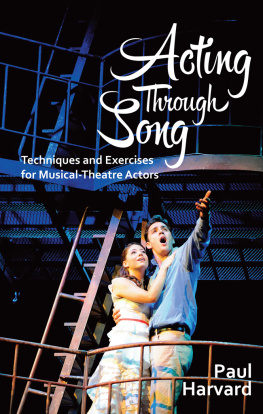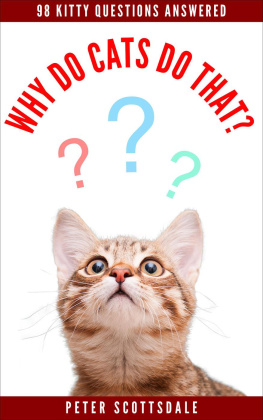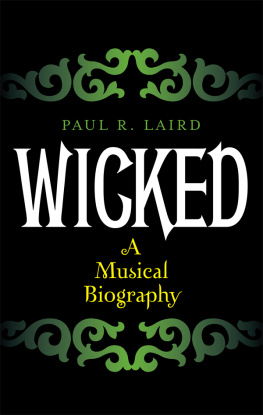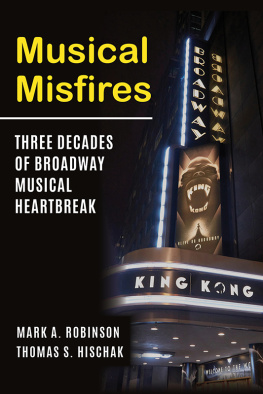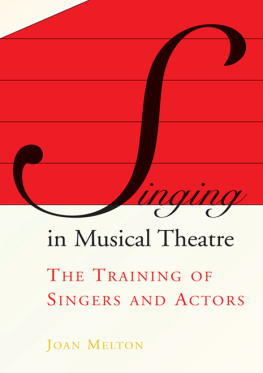
SECRETS OF
STAGE SUCCESS
Your Questions Answered

NICK HERN BOOKS
London
www.nickhernbooks.co.uk
For our Mama
Rebecca Sichel-Coates
Thanks for all your constant guidance, love and support
Contents
Introduction
We were working together in the West End production of the mega-musical Wicked, Mark as Fiyero, and Louise at the time as Galinda (though she went on to play Elphaba too). Whenever we werent dancing through life or defying gravity, we would chat about our similar backgrounds and interests: how we both had a passion for performing from a very young age; how we worked hard at our hobbies through our teenage years; our experiences training at the same college, although not at the same time; what it was like starting to audition for and get roles and moving through a succession of professional productions; and our shared opinions and experiences the good and the bad that come along with any career in the entertainment industry.
We are both asked for advice from aspiring performers, sometimes at stage door after a performance, from letters sent to theatres or via our agents, and increasingly on social media. There is such demand for information about how to break in to the entertainment industry from young people who, exactly like us when we were younger, want to make it their career. So we decided that we could combine our experiences and knowledge in writing a handbook about how todays commercial-theatre industry works, and to offer some words of advice to anyone whod like to make it their livelihood too.
In order to make the book as helpful as possible, and to answer the questions that people really want and need the answers to, we decided to invite you to tell us what you wanted to know. We encouraged anyone, of any age, anywhere in the world, to post questions via a special website that we set up. To the many, many hundreds of you who did, THANK YOU! Your questions were interesting, thought-provoking, intelligent and revealing; and weve answered as many as we thought we could cover in one book. We really appreciate everything you asked, and we genuinely couldnt have written this book without you (if weve answered your question, then your names in the back of the book). Even if youre not planning on a career on stage yourself, but have an active interest in theatre, we hope that the book draws back the curtain and shines a spotlight onto the realities of life as a performer.
The book is divided into four chapters that cover, broadly, training for a career in theatre; auditioning for roles; getting jobs and performing; and then managing and maintaining a lifelong career. Most of the questions weve answered together, but if one of us has a specific experience or an anecdote thats relevant, weve included that too, indicated by a little headshot. Weve also written about our most memorable moments in the business which are dotted between the chapters on shaded grey pages.
Of course, everything that follows comes from our own experiences, performing in some of the biggest West End musicals of the last decade so its naturally focused on musical theatre, and mainly on opportunities in the UK. Weve also made a conscious decision only to cover working on stage, rather than what its like being a performer on screen. Other performers will have had different experiences and may have different advice. But whats here is anhonest reflection of our ideas and opinions, that come from spending thousands of hours in classes, workshops, audition rooms, rehearsal spaces and, of course, on stage.
In some ways, we are writing this book for earlier incarnations of ourselves. It contains all the secrets of this crazy, wonderful, exhausting, exciting, bewildering but brilliant profession, that we wished wed known when we were starting out. If youre in that position now, dreaming of a career on the stage, we hope that this book reveals the secrets you need to know.
We hope you enjoy reading it.
Louise and Mark x

Part One
Secrets of
Learning Your Craft
Training and Developing

If you define an actor as someone who interprets and portrays a dramatic character, then it could be argued that anyone can do it. When we were children, we would make believe all the time, using our imaginations effortlessly to portray cops and robbers, astronauts in space, explorers in the jungle, or pretend to be our favourite pop stars. Later in life, if weve ever read a bedtime story to a child, then we can all put on the voice of the Big Bad Wolf, huffing and puffing to blow down the poor little pigs houses. We also adopt different roles in life all the time, depending on where we are: at work, with our families, down the pub with our friends
So everyone has a natural ability to make believe and pretend, put on voices and impersonate. And there are certainly those who have a natural gift and talent for connecting to a character on a deep emotional level, and investing in that completely until they almost become that other person. But thats not quite the same as being a professional performer, when you need to be able to do it insuch a way that connects with a larger audience, and with a certain range of skills and abilities many of which arent as natural or intuitive as pretending to be someone else, but all of which can certainly be trained, developed, practised and improved.
For that reason, you should only aim to become a performer if you genuinely have natural abilities. And then we strongly believe that you should train those abilities. Acting is an exposing and vulnerable state to put yourself in, and so learning and developing in a supportive environment is invaluable. You are not a professional performer until you get paid to do it, so you need to keep working hard and developing your craft until someone is confident enough to invest in you by giving you a pay cheque!
Ask yourself: do you love performing and dont want to do anything else? Do you love it enough to commit your time and energy to training hard? Do you have what it takes to enjoy the highs, and to survive the lows? If you dont answer Yes to all these questions, but you love being around the theatre and are interested in what happens behind the curtain, then maybe a job backstage might be for you.
There are the important roles on the creative team director, musical director, choreographer, designers (of set, costume, lights, sound, and so on). Often these jobs require a specialist training, though are sometimes done by people who have been performers themselves. Choreographers areoften former dancers. Similarly, theres an established route from people working up through the ensemble to being resident and assistant directors, responsible for looking after the show on a daily basis, up to directing productions themselves. Most of these roles, though, are done towards the start of productions, during the preparation, rehearsals and getting the show up and running; theyre not responsible for being present every day, working on the production from night to night.
There are lots of technical and backstage staff who are in the theatre every day, working just as often, and just as hard, as the performers on stage. To work backstage, it helps to have a calm, quiet and quick mind, and to be able to deal with situations efficiently without panic! The options here include stage management and stage crew, lighting and sound operators and technicians, carpenters, construction (including mechanical parts), flymen (who operate moving scenery), and the wigs, make-up and costume departments.

